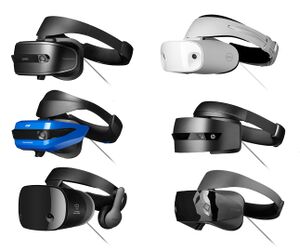Difference between revisions of "Glossary:Windows Mixed Reality"
KingKrouch (talk | contribs) (Removed captions and turned images into thumbnails) |
Yuuyatails (talk | contribs) |
||
| (8 intermediate revisions by 6 users not shown) | |||
| Line 3: | Line 3: | ||
''For a list of games, see [[List of VR games]].'' | ''For a list of games, see [[List of VR games]].'' | ||
| + | {{Introduction | ||
| + | |introduction = The '''{{PAGENAME}}''' (WMR for short) was a VR/AR platform developed by [[Company:Microsoft|Microsoft]]. | ||
| − | + | With the exception of Microsoft's own HoloLens headsets, all WMR headsets were made by third-party companies. | |
| − | + | ||
| − | + | |release history = WMR was first introduced in Windows 10 1709 (also known as Fall Creators Update), which was released on October 17, 2017. Since Windows 10 1809, support for the OpenXR standard was added. | |
| − | + | ||
| + | |current state = Because WMR headsets are PC-only headset, the included motion controllers must be connected to the host PC via Bluetooth 4.0 connectivity. It should be noted that not all VR games support the WMR headsets natively and requires workaround such as [[#Revive|Revive]] and [[#Mixed Reality for SteamVR|Mixed Reality for SteamVR]] in order to play those games. | ||
| + | |||
| + | In December 2023, Microsoft announced the deprecation of WMR platform, with the complete removal of the platform planned in future Windows OS releases, starting with Windows 11 24H2. | ||
| + | }} | ||
'''General information''' | '''General information''' | ||
| Line 25: | Line 31: | ||
==Official software== | ==Official software== | ||
====[https://www.microsoft.com/en-us/p/mixed-reality-portal/9ng1h8b3zc7m Mixed Reality Portal]==== | ====[https://www.microsoft.com/en-us/p/mixed-reality-portal/9ng1h8b3zc7m Mixed Reality Portal]==== | ||
| − | {{ii}} | + | {{ii}} Windows 10, and a Microsoft account is required to download the Mixed Reality Portal from the Microsoft Store. |
====[https://store.steampowered.com/app/719950/ Mixed Reality for SteamVR]==== | ====[https://store.steampowered.com/app/719950/ Mixed Reality for SteamVR]==== | ||
{{ii}} Installing this compatibility layer is required to run SteamVR on Mixed Reality headsets. | {{ii}} Installing this compatibility layer is required to run SteamVR on Mixed Reality headsets. | ||
| + | |||
| + | ====[https://apps.microsoft.com/store/detail/openxr-for-windows-mixed-reality/9P9596DJJ19R OpenXR for Windows Mixed Reality]==== | ||
| + | {{ii}} Installing this compatibility layer is required to run OpenXR applications on Mixed Reality headsets. | ||
==Features== | ==Features== | ||
| Line 58: | Line 67: | ||
! Headset !! Display !! Audio !! Features !! Release Date || Image | ! Headset !! Display !! Audio !! Features !! Release Date || Image | ||
|- | |- | ||
| − | | Acer Windows Mixed Reality Headset || | + | | Acer Windows Mixed Reality Headset || 1440x1440 per eye. Total resolution of 2880x1440.<br/><br/>90 Hz low persistence LCD.<br/><br/>95° FOV. || 3.5mm combo jack. || Flip up display<br/><br/>4m cable<br/><br/>Fixed IPD || October 17, 2017 || [[File:Acer Windows MR.jpg|200px]] |
|- | |- | ||
| − | | Acer OJO 500 || | + | | Acer OJO 500 || 1440x1400 per eye. Total resolution of 2880x1440.<br/><br/>90 Hz low persistence OLED.<br/><br/>100° FOV. || Integrated headphones and microphone. || Fixed display<br/><br/>4m cable<br/><br/>Adjustable IPD || November, 2018 || [[File:Acer_OJO_500.jpg|200px]] |
|- | |- | ||
| − | | Asus Windows Mixed Reality Headset || | + | | Asus Windows Mixed Reality Headset || 1440x1440 per eye. Total resolution of 2880x1440.<br/><br/>90 Hz low persistence LCD.<br/><br/>95° FOV.<br/><br/>Aspheric Fresnel Lenses. || 3.5mm combo jack. || Flip up display<br/><br/>4m cable<br/><br/>Fixed IPD || June 12, 2018 || [[File:RbzVzIxmTz647eLr setting fff 1 90 end 500.jpg|200px]] |
|- | |- | ||
| − | | Dell Visor || | + | | Dell Visor || 1440x1440 per eye. Total resolution of 2880x1440.<br/><br/>90 Hz low persistence LCD.<br/><br/>110° FOV. || 3.5mm combo jack. || Flip up display<br/><br/>4m cable<br/><br/>Fixed IPD. || October 17, 2017 || [[File:Dell Visor.jpg|200px]] |
|- | |- | ||
| − | | HP Windows Mixed Reality Headset || | + | | HP Windows Mixed Reality Headset || 1440x1440 per eye. Total resolution of 2880x1440.<br/><br/>90 Hz low persistence LCD.<br/><br/>100° FOV. || 3.5mm combo jack and microphone || Flip up display<br/><br/>4m cable<br/><br/>Fixed IPD || October 17, 2017 || [[File:HP_Windows_MR.jpg|200px]] |
|- | |- | ||
| − | | HP Reverb G2 || | + | | HP Reverb G2 || 2160x2160 per eye. Total resolution of 4320x2160.<br/><br/>90 Hz low persistence LCD.<br/><br/>114° FOV. || Integrated off-ear headphones and integrated microphone, similar to the [[Glossary:Valve_Index|Valve Index]]. || 6m cable<br/><br/>Adjustable IPD || November, 2020 || [[File:HP_Reverb_G2.png|200px]] |
|- | |- | ||
| − | | Lenovo Explorer || | + | | Lenovo Explorer || 1440x1440 per eye. Total resolution of 2880x1440.<br/><br/>90 Hz low persistence LCD.<br/><br/>105° FOV. || 3.5mm combo jack. || Flip up display<br/><br/>4m cable<br/><br/>Fixed IPD || October 17, 2017 || [[File:Lenovo_Explorer.jpg|200px]] |
|- | |- | ||
| − | | Samsung HMD Odyssey || | + | | Samsung HMD Odyssey || 1440x1600 per eye. Total resolution of 2880x1600.<br/><br/>90 Hz low persistence OLED.<br/><br/>110° FOV. || Integrated AKG headphones and dual microphone array. || Fixed display<br/><br/>4m cable<br/><br/>Adjustable IPD. || November 6, 2017 || [[File:Samsung_HMD_Odyssey.jpg|200px]] |
|- | |- | ||
| − | | Samsung HMD Odyssey+ || | + | | Samsung HMD Odyssey+ || 1440x1600 per eye. Total resolution of 2880x1600.<br/><br/>90 Hz low persistence OLED.<br/><br/>110° FOV. || Integrated AKG headphones and dual microphone array. || 4m cable<br/><br/>Adjustable IPD || October 22, 2018 || [[File:Samsung HMD Odyssey+.jpg|200px]] |
| + | |} | ||
==Essential improvements== | ==Essential improvements== | ||
| Line 94: | Line 104: | ||
|minother = 1x USB 3.0 or Type-C<br>HDMI 1.4 or DisplayPort 1.2<br>Bluetooth 4.0 | |minother = 1x USB 3.0 or Type-C<br>HDMI 1.4 or DisplayPort 1.2<br>Bluetooth 4.0 | ||
| − | |recOS = | + | |recOS = |
|recCPU = Intel Core i5 4590 | |recCPU = Intel Core i5 4590 | ||
|recCPU2 = AMD Ryzen 5 1400 3.4 GHz | |recCPU2 = AMD Ryzen 5 1400 3.4 GHz | ||
| − | |recRAM = | + | |recRAM = |
| − | |recHD = | + | |recHD = |
|recGPU = Nvidia GeForce GTX 960 | |recGPU = Nvidia GeForce GTX 960 | ||
|recGPU2 = AMD Radeon RX 460 | |recGPU2 = AMD Radeon RX 460 | ||
|recGPU3 = AMD Radeon RX 560 | |recGPU3 = AMD Radeon RX 560 | ||
| − | |recDX = | + | |recDX = |
|recother = 1x USB 3.0 or Type-C<br>HDMI 2.0 or DisplayPort 1.2<br>Bluetooth 4.0 | |recother = 1x USB 3.0 or Type-C<br>HDMI 2.0 or DisplayPort 1.2<br>Bluetooth 4.0 | ||
}} | }} | ||
| + | {{ii}} The service may require a CPU with [[Wikipedia:Advanced Vector Extensions|AVX]] instructions to work properly. [https://old.reddit.com/r/WindowsMR/comments/e468ge/odysseywmr_on_legacy_hardware_controller_tracking/ Potential] [https://old.reddit.com/r/WindowsMR/comments/l4ytks/windows_mr_and_old_cpus_avx_it_works/ workarounds] can be tried. | ||
{{References}} | {{References}} | ||
| Line 110: | Line 121: | ||
[[Category:Hardware]] | [[Category:Hardware]] | ||
[[Category:Controller]] | [[Category:Controller]] | ||
| + | [[Category:VR and XR headsets]] | ||
Latest revision as of 05:47, 19 February 2024
Graphics and video
Resolutions
Video settings
- Field of view (FOV)
- Windowed / borderless fullscreen
- Anisotropic filtering (AF)
- Anti-aliasing (AA)
- High-fidelity upscaling
- Vertical sync (Vsync)
- Frame rate (FPS)
- High dynamic range (HDR)
- Ray tracing (RT)
- Color blind mode
Hardware
For a list of games, see List of VR games.
The Windows Mixed Reality (WMR for short) was a VR/AR platform developed by Microsoft.
With the exception of Microsoft's own HoloLens headsets, all WMR headsets were made by third-party companies.
WMR was first introduced in Windows 10 1709 (also known as Fall Creators Update), which was released on October 17, 2017. Since Windows 10 1809, support for the OpenXR standard was added.
Because WMR headsets are PC-only headset, the included motion controllers must be connected to the host PC via Bluetooth 4.0 connectivity. It should be noted that not all VR games support the WMR headsets natively and requires workaround such as Revive and Mixed Reality for SteamVR in order to play those games.
In December 2023, Microsoft announced the deprecation of WMR platform, with the complete removal of the platform planned in future Windows OS releases, starting with Windows 11 24H2.
General information
Headset information
- Acer Windows Mixed Reality Headset
- Dell Visor
- HP Windows Mixed Reality Headset
- Lenovo Explorer
- Asus HC102
- Samsung HMD Odyssey
- HP Reverb G2 Headset
Official software
Mixed Reality Portal
- Windows 10, and a Microsoft account is required to download the Mixed Reality Portal from the Microsoft Store.
Mixed Reality for SteamVR
- Installing this compatibility layer is required to run SteamVR on Mixed Reality headsets.
OpenXR for Windows Mixed Reality
- Installing this compatibility layer is required to run OpenXR applications on Mixed Reality headsets.
Features
3D
Stereoscopic 3D.
Tracking
Each headset uses an accelerometer and gyroscope to track headset rotation, and uses inside-out tracking for room-scale motion tracking and controller tracking.
Each headset excluding the Dell Visor uses a proximity sensor to check if the headset is being worn.
Motion controllers
The Windows Mixed Reality Motion Controllers come with each headset, and are manufactured by each headset manufacturer independently, following Microsoft's exact hardware design and spec. This causes some controllers to be higher quality than other controllers, depending on who manufactured them. The Samsung HMD Odyssey and Samsung HMD Odyssey+ controllers use a unique, more rounded design and are said to be the best quality.
Each controller features a trigger, touchpad, analogue stick, a menu button and a system button. They are tracked via the headset's inside-out positional tracking cameras.
The HP Reverb G2 replaces the touchpad on each controller with two buttons, and uses a different layout for the analog stick, system/menu buttons, and grip buttons.
When the controllers leave the headset's positional camera's FOV, they are no longer tracked, but do still use gyroscope and accelerometer information to estimate the controller's position.
Windows Mixed Reality immersive headsets
| Headset | Display | Audio | Features | Release Date | Image |
|---|---|---|---|---|---|
| Acer Windows Mixed Reality Headset | 1440x1440 per eye. Total resolution of 2880x1440. 90 Hz low persistence LCD. 95° FOV. |
3.5mm combo jack. | Flip up display 4m cable Fixed IPD |
October 17, 2017 | 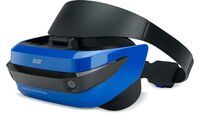
|
| Acer OJO 500 | 1440x1400 per eye. Total resolution of 2880x1440. 90 Hz low persistence OLED. 100° FOV. |
Integrated headphones and microphone. | Fixed display 4m cable Adjustable IPD |
November, 2018 | 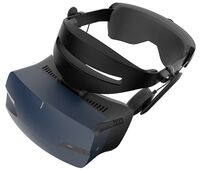
|
| Asus Windows Mixed Reality Headset | 1440x1440 per eye. Total resolution of 2880x1440. 90 Hz low persistence LCD. 95° FOV. Aspheric Fresnel Lenses. |
3.5mm combo jack. | Flip up display 4m cable Fixed IPD |
June 12, 2018 | 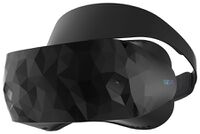
|
| Dell Visor | 1440x1440 per eye. Total resolution of 2880x1440. 90 Hz low persistence LCD. 110° FOV. |
3.5mm combo jack. | Flip up display 4m cable Fixed IPD. |
October 17, 2017 | 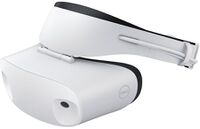
|
| HP Windows Mixed Reality Headset | 1440x1440 per eye. Total resolution of 2880x1440. 90 Hz low persistence LCD. 100° FOV. |
3.5mm combo jack and microphone | Flip up display 4m cable Fixed IPD |
October 17, 2017 | 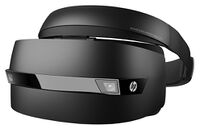
|
| HP Reverb G2 | 2160x2160 per eye. Total resolution of 4320x2160. 90 Hz low persistence LCD. 114° FOV. |
Integrated off-ear headphones and integrated microphone, similar to the Valve Index. | 6m cable Adjustable IPD |
November, 2020 | 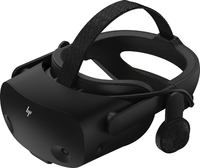
|
| Lenovo Explorer | 1440x1440 per eye. Total resolution of 2880x1440. 90 Hz low persistence LCD. 105° FOV. |
3.5mm combo jack. | Flip up display 4m cable Fixed IPD |
October 17, 2017 | 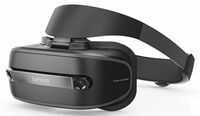
|
| Samsung HMD Odyssey | 1440x1600 per eye. Total resolution of 2880x1600. 90 Hz low persistence OLED. 110° FOV. |
Integrated AKG headphones and dual microphone array. | Fixed display 4m cable Adjustable IPD. |
November 6, 2017 | 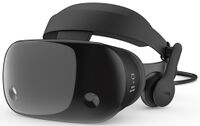
|
| Samsung HMD Odyssey+ | 1440x1600 per eye. Total resolution of 2880x1600. 90 Hz low persistence OLED. 110° FOV. |
Integrated AKG headphones and dual microphone array. | 4m cable Adjustable IPD |
October 22, 2018 | 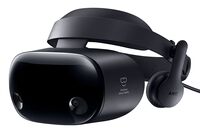
|
Essential improvements
Revive
Allows Windows Mixed Reality owners to play Oculus exclusive games via SteamVR. GitHub page with install instructions and downloads are here.
System requirements
| Windows | ||
|---|---|---|
| Minimum | Recommended | |
| Operating system (OS) | 10 Fall Creators Update | |
| Processor (CPU) | Intel Core i5 7200U | Intel Core i5 4590 AMD Ryzen 5 1400 3.4 GHz |
| System memory (RAM) | 8 GB | |
| Hard disk drive (HDD) | 10 GB | |
| Video card (GPU) | Intel Integrated HD Graphics 620 Nvidia MX150 Nvidia GeForce 965M DirectX 12 compatible | Nvidia GeForce GTX 960 AMD Radeon RX 460 AMD Radeon RX 560 |
| Other | 1x USB 3.0 or Type-C HDMI 1.4 or DisplayPort 1.2 Bluetooth 4.0 |
1x USB 3.0 or Type-C HDMI 2.0 or DisplayPort 1.2 Bluetooth 4.0 |
- The service may require a CPU with AVX instructions to work properly. Potential workarounds can be tried.

